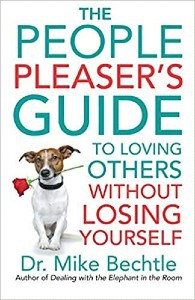John Fuller: Today, on Focus on the Family, we’re going to return to the topic of people pleasing and why that is not always a good thing. Your host is Focus president and author Jim Daly, and I’m John Fuller. And Jim, let’s start off with some perspectives on what people pleasing is like. Um, you’re not required to set yourself on fire to keep other people warm.
Jim Daly: (laughs). That one right there is pretty funny. How about when you say yes to others and make sure you’re not saying no to yourself. Uh, people pleasing hides the real you.
Jim: Okay. The pop singer, Ed Sheeran who said this, “I can’t tell you the key to success, but the key to failure is trying to please everyone.” That’s pretty powerful. And what’s ironic about people pleasing is that it’s well intentioned. We can pat ourselves on the back how nice we are toward others, and people pleasers wanna be liked and take care of other people. And at the core, it’s not a bad thing, but somewhere along the line, that motivation may be misplaced, and their approach can get outta control. And we talked about this last time with our guest, Dr. Mike Bechtle and, uh, I’m looking forward to today’s discussion as well.
John: I am as well. He has written a great book. It’s very helpful, it’s called, The People Pleasers Guide to Loving others Without Losing Yourself. And, um, there is an autobiographical element to the book, and it really is a, a very powerful tool. Uh, get a copy from us here at the ministry. Uh, you can call 800, the letter A, and the word FAMILY, or stop by focusonthefamily.com/broadcast.
Jim: Mike, welcome back to the program.
Dr. Mike Bechtle: Thank you very much.
Jim: Now, last time, you know, some people may have misunderstood me. Jean is a self-described people pleaser, and so some of the examples I mentioned last time are things that she shared with me. But that is right at the top of day two now, uh, you know, to grab those that may not even know that they’re people pleasers. Describe for us what that people pleaser behavior, the unhealthy people pleaser behavior looks like.
Dr. Bechtle: We all wanna be people pleasers. We all want people to please us. Where it gets unhealthy is when I’m trying to meet my own needs by pleasing other people.
Jim: Right. Even to a fault.
Dr. Bechtle: Exactly. It can be that I wanna take care of you, I wanna help you, I want to, to offer to do things for you so that you will see me in a positive way, but I’m becoming invisible when I do that. Beca-
Jim: What’s the healthier tape in your head though? I mean, if you want to, you know, demonstrate the gospel to people, you are doing things to take care of others, that’s admirable, but it gets back to the motivation of why you’re doing it.
John: Hmm.
Dr. Bechtle: Evangelism has an interesting component to it because a lot of people, especially people pleasers, do evangelism in order to get other people to see that they’re doing what they’re supposed to do. It’s a guilt-based evangelism.
Jim: That’s interesting.
Dr. Bechtle: And so they’re doing it because I want you to be able to say, “Look at him, he’s doing evangelism. He’s sharing his faith.” And it’s not because I care about people, if I’m a people pleaser, it could just be because I wanna get the check marks. I want your affirmation in what I’m doing. Where it changes is when I can reach out to other people because I care about them.
Jim: Right.
Dr. Bechtle: And it changes from having to do it for my own needs, but it’s like, they really have something that I can give them an answer to.
Jim: Well, and I appreciate that because again, as we started last time, John, I mean, people pleasing I think we all have a little bit of that in us. I mean-
Dr. Bechtle: We should.
Jim: Uh, it is a God thing. Uh, it just gets unhealthy when we’re putting the focus on ourselves. Mike, one of the things you mentioned in the book that caught me was this discussion about mirrors. How we assume that everything we see in a mirror is accurate. Now, I, I think that is a fair statement. But you say, “No. Maybe not.” How is that?
Dr. Bechtle: Well, we’ve all gone to the county fair where they have the fun house with the mirrors that make-
Jim: (laughs).
Dr. Bechtle: … make your head the size of a volleyball and your body, the size of a Volkswagen or vice versa.
Jim: Right.
Dr. Bechtle: And we, we know that they’re distorted. But we look in the mirror and we assume that it’s right. We never question it. We don’t say, “I don’t like what I see in the mirror that the mirror must be bad.” It’s like, no, I think I’m bad. But we start using other people as a mirror. The way I see myself comes from what other people see, how they respond to me.
Jim: Ah.
Dr. Bechtle: That’s when it becomes a problem. Because I’m starting to, to find truth in what other people say instead of what’s really true.
Jim: Yeah. Is there such a thing as a skinny mirror? Is that real? (laughs).
John: (laughs). If you pay enough money, sure.
Jim: I need to buy some of those. I’d like to fill my house up with skinny mirrors. Uh, but you described that scary mirror as well. And that’s the one in your home. What is the scary mirror and why should we be panicked about that one?
Dr. Bechtle: It’s one of those round mirrors that magnifies-
Jim: (laughs). Oh, yeah.
Dr. Bechtle: … a lot of people have.
Jim: You see every pore.
Dr. Bechtle: Oh, yeah.
Jim: Yeah.
Dr. Bechtle: Because, and it’s great when you have a splinter and you’re trying to get it out of your finger, but if we look at it too close, we see every little imperfection. Like you said, every pore, everything that’s wrong. And if that’s what we look at and we look that close, we assume that if we can see all those things that looks horrible, everybody else must see them too.
Jim: Yeah.
Dr. Bechtle: And so it’s looking too closely at ourselves, assuming that my perception of me is, has to be your perception of me. And that’s when it becomes a problem.
John: Yeah.
Jim: So what’s the healthy side of that? What’s the right distance from the mirror-
Dr. Bechtle: Oh.
Jim: … that you should be looking?
Dr. Bechtle: That’s a great question. I think the healthy place is to get close, to look at it, to see those details, and then pull back so I can see what other people see. But the reason I look close is so I can change anything that I need to, then I could walk away. That’s why you go to a restroom, they all have mirrors, you look before you go back out into the world. And that’s a healthy thing. But it’s unhealthy if I look at the scary mirror and stay with it too long, and then I may not even go back in the, out into the world.
Jim: Huh? Um, another aspect that you mentioned in the book is this idea of integrity and how that’s an antidote to people pleasing. You know, that’s all of what we’re talking about. It is kind of the fundamental character that we need. That idea of integrity. We need to pursue that every day in our decisions and interactions with others. You share a story about a, a challenge you were given to spend an entire day without lying. Now, I can’t believe you, you struggled in that day. (laughs). But I guess in some ways, when somebody says, “Does this dress look good on me?” If you don’t tell them the truth, I guess that’s a little bit of a, a lie. But what was that day like? And where did you fail?
Dr. Bechtle: I thought it was gonna be easy because it’s not what I see as part of my character. But I had to, uh, go about my day. And the first thing that happened was I had a client who called me and said, “I’m having a problem with this particular thing, do you think you could help me find a solution?” I said, “Yeah. Let me take it up the food chain.” And so I talked to our tech department and said, “I- I’ve got several clients that are having this problem.”
Jim: Okay.
Dr. Bechtle: And I thought, several clients, I exaggerated because I thought it would probably get them moving more than if I just said, “I have a client.” And I realized six other times that day I did something similar. For me, it was exaggeration.
Jim: So it wasn’t big, but it was obvious to you?
Dr. Bechtle: Yeah. It wasn’t exactly accurate.
Jim: Yeah.
Dr. Bechtle: And I think we tend to Photoshop ourselves because we wanna put ourselves out in a certain way. I remember teaching at one of the, um, film studios in Hollywood, and I ha- had lunch with one of the people that was just in the class. And I said, “So what do you do?” He said, “Well, I work on the web.” I said, “So you’re an IT guy?” He said, “No, I’m, we’re filming Spider-Man, and I’m the guy who does the web that comes out of his hand.”
Jim: (laughs).
Dr. Bechtle: Then he throws it. And I said, “Well, how do you do that?” He said, “Well, we just get up on the roof and we take a ball of yarn, and when it’s windy, we throw it over the edge and film it, and then we use the computer to turn that into a spider web, so it looks realistic.”
Jim: Huh?
Dr. Bechtle: He said, “None of it’s realistic.” He said, “Everything I do is untrue,” is the way he said it.
Jim: Oh, interesting.
Dr. Bechtle: And it’s, uh, he said, “But we tend to do that.” People pleasers do that with their lives. It’s like, I wanna put myself out there. I wanna Photoshop my life so that you see me in a certain way. I need to pull back from that.
John: Hmm. Does that relate kind of to what the, we talked about last time on social media? I mean, are there people that are, are doing a fake world just to please others and they wouldn’t dare show anything real?
Dr. Bechtle: I think so, but I don’t know if it’s intentional. I think they may do it because they’ve grown into it. It’s like, well, this is what everybody else is doing on social media.
John: Yeah.
Dr. Bechtle: This is… I’m not gonna get on there and talk about what a great conversation I had with my parole officer last week, because it’s, it’s different. We’re trying to project our best image. It’s how social media works.
John: Yeah.
Dr. Bechtle: And there’s a healthy side of social media, but if I can figure out ways to pull integrity into it so it’s honest, I think we can actually use it as a tool.
Jim: Yeah. Le- let’s move to another, uh, character trait that you identified. And that was to foster curiosity. I like that. Um, for the people pleaser why is curiosity, an important attribute to pursue.
Dr. Bechtle: Because if I’m trying to grow away from the wrong kind of people pleasing, if I’m curious about you and genuinely curious, then I’m not just trying to get you to respond to me in a certain way. It’s like, I can set that aside. I’m not worried about me anymore. I really wanna find out about you. And one of the simplest things I can do is to listen deeply to what you say in a response.
Jim: Be curious.
Dr. Bechtle: Yeah. I can, because then when you say something, as, something as simple as saying, “Well, tell me more,” and then you tell me more and I’ll ask another question so that I am really trying to explore. I did that yesterday at the airport. I was in line with somebody and, and I, she asked me a question, we’re just waiting to get on the plane, and I just responded, but I asked her a deeper question, so I explored. You take that little question, tell me more, you can repeat it to find out… Because I was just curious. It was a fascinating conversation. I didn’t say hardly anything. I just explored because I wanted to know. And I wasn’t worried about how I was coming across. I wasn’t trying to get her to like me. The more curious we can become; I think the easier it is to get into this proper kind of-
Jim: You know, when you say it that way, it sounds like what Jesus did with his interactions with people. He would start with questions and-
Dr. Bechtle: Well, yeah. The Samaritan woman.
Jim: Yeah. I mean, really, and really just help them almost under- realize for themselves as they’re speaking, oh, that’s me or, oh, I do that, right? That’s exactly, I think how the Lord deals in our own hearts today, because he’s still alive in us, right? And that’s, I think part of the Holy Spirit’s work in our heart, just to whisper, “That’s you.” (laughs). “You’re the one.”
Dr. Bechtle: I think a fascinating, uh, exercise would be to go through the New Testament and just look for every question that Jesus asked-
John: Mm-hmm.
Dr. Bechtle: … through four, through the four gospels.
Jim: That would be good.
Dr. Bechtle: Just capture those and see how did he use those?
John: Yeah. Dr. Mike Bechtle is our guest today on Focus on the Family. Your host is Jim Daly and uh, we’d love to put a copy of, uh, Dr. Bechtle’s book, The People Pleasers Guide to Loving Others Without Losing Yourself into your hands. So donate as you can and request that book, when you call 800, the letter A, and the word FAMILY, 800-232-6459.
Jim: And Mike, one of the things that we mentioned last time that I think we need to pay especially high attention to is gratefulness as Christians. Uh, for those that are joining us today, what, what is the gratefulness aspect of people pleasing?
Dr. Bechtle: It’s one of the quickest ways to heal from being the wrong kind of people pleaser. When I can intentionally change my focus to be grateful for almost everything, I have my life. I’m not trying to get my self-esteem from you and what you say, I’m grateful for what God has given me, who he’s made me and the opportunities. I think about years ago, going up to my father-in-law’s cabin, up in the, um, in the Sierras, in Central California. And there was supposed to be a meteor shower that night, and it had the, according to the news, it had the potential to be the biggest meteor shower ever, or it could be the biggest dud. And I’m gonna be at 6,000 feet with no city lights, it’s like, it couldn’t have been better. So I went outside, it was about two in the morning. It was probably 20 degrees, but I’m standing outside, and I just waited, and I’m looking up in this dark sky and I probably was there for about 20 minutes, didn’t see a thing.
Jim: (laughs).
Dr. Bechtle: And then, then I, out loud, I found myself saying, “Well, that’s a disappointment.” And then immediately I realized that I’d never seen that many stars in one spot.
John: Mm-hmm.
Jim: Yeah.
Dr. Bechtle: That I was missing the wonder, because I was focused on the one thing I didn’t have.
John: Yeah.
Dr. Bechtle: And to be intentional about it, always looking that direction, the more we can focus on gratefulness, the more that people pleasing just drops away.
Jim: Right.
John: Yeah. Mike, uh, moving a bit from some of those good and godly perspectives into the practical realm. I’m thinking about people pleasers in the workplace. What observations do you have about how that looks? It feels to me like a people pleaser can be taken advantage of. For instance, uh, we had a coworker years ago and that, that guy said yes to everybody that walked by needing something, except he wasn’t saying yes to his boss, he was saying yes to everybody else. So there was, there was a misapplication. What, what would you observe?
Dr. Bechtle: Well, I think there’s a couple of things that I’ve seen. One of them relates to your boss.
John: Oh.
Dr. Bechtle: Because obviously you want to please your boss because they handle the paycheck. And so you’re going to say yes, sometimes whether you want to or not, but you want them to think you’re doing a good job. It’s real easy, especially in the early j- days of that relationship, to be able to become more of a people pleaser and you lose the strength of the relationship that can come when you’re real and when you’re vulnerable and have integrity in that relationship. And the other one centers around posturing with a team. And I’ve been on hundreds, probably thousands of Zoom calls over the last few years and watching team members on from a different company that are always talking about how excited they are about something someone else said, and they affirm them in this. And I find out later it’s like, they thought that was the stupidest idea ever.
Jim: (laughs).
Dr. Bechtle: But because they’re in public, they’re doing, they wanna be the one giving the affirmations and there’s not integrity behind it. And that’s very common.
Jim: Wow. That’s uh, seems destructive. Not just, you know-
Dr. Bechtle: Mm-hmm.
Jim: … but very destructive to the team.
John: Yeah.
Jim: So that’s one of the difficulties. Uh, you’ve alluded to this a few times that people pleasing can be a, a big problem in the Christian community, uh, because it’s part of our spiritual DNA to care for others. And again, I think I wanna make sure the listeners and the viewers understand this delicate nature between, you know, taking care of people around you and then making sure you’re doing it with the right motivation. The Bible’s full of instructions about loving, serving, sacrificing for others. So it, it pushes us in that direction.
Dr. Bechtle: Mm-hmm.
Jim: So how, how do we put all of that into the proper perspective? We’ve mentioned it last time, but I, I wanna make sure people get this again.
Dr. Bechtle: Most, uh, most Jesus followers assume that people pleasing is a bad thing and they’ll say, “Well, just quit worrying about what other people think.” But God designed us to be in community. We need to please other people. And it’s all through scripture. Uh, Genesis 2:18, God says, “It’s not good for man to be alone.” Now we usually use that in the context of a, a marriage relationship, but I think it stands on its own as well. It’s not good for a man to be alone. Which is why it bugs me that I write self-help books-
John: (laughs).
Dr. Bechtle: … they’re categorized that way, because our tendency is, well, I have a problem, I’m a people pleaser. I want to fix it; I’ll get a book and do what it says. And I just find that really is hard to do. You know where it really becomes effective is to get a book like this and sit down and go through it with three or four other people. Then we have community. ‘Cause it’s-
Jim: And accountability. (laughs).
Dr. Bechtle: And accounta- exactly. Because you’ve got, you’ve got the relationship. God wants us to work together. And throughout scripture, there’s so many verses-
Jim: Yeah.
Dr. Bechtle: … that have to do with that.
Jim: You know, so often I, there’s so many personality profile tests out there-
John: Mm-hmm.
Jim: … and whenever I’m in a position, and it hasn’t been recent, but whenever I’m taking one of those, I’m often thinking, how would the Lord score on this? A disc test, he’d score perfectly. So what does that look like?
John: (laughs).
Jim: You know, the Lord would be perfect in every way, you know, beaver, otter, golden retriever, all that. And I, I think in that application, we so often wanna look at the example of Jesus and what he did. And in this area, I mean, he was very tun- attuned to the needs around him. And whether that was Martha, Mary, Lazarus, I mean, all those things, the woman at the well, the Samaritan woman, there’s all these great examples. The, uh, the crippled person. Uh, put that into some context for us as what example was Jesus actually giving us in that balance of taking care of people. He also retreated and he rested.
Dr. Bechtle: Mm-hmm.
Jim: And he was exhausted from all of this. So what’s that balancing factor look like?
Dr. Bechtle: Well, he was completely God, but he was completely human. And that’s why we can identify with him. I don’t know how he would score on those tests, maybe he would be perfect. But we don’t have to copy that example and say, “We have to be perfect,” he was completely himself. That’s what we need to do, is to learn how he created us uniquely and build that. That’s where the strength comes from. And to do that in the context of other people. Because it’s, we grow around others. That’s where strength really happens.
Jim: Yeah. Mike, the scripture also talks about the Lord’s yoke being light. This can be a delicate one because as we’re doing Christian work, uh, whether we’re working vocationally outside of the church, but then we’re going to the church on Sunday, and maybe the pastors come up to us and said, “Boy, I really need somebody to lead that building fund campaign. Can you do that?” “Sure. Sure. I, you know, I’m, boy, I’m so impressed that you asked me to do that. I’d love to ha- help you pastor.” And, you know, and you can apply that to anything, for the hardworking woman who’s asked to do a lot at the church with the nursery, whatever. Um, where does that yoke become not light, and I’ve said yes to too many things?
John: Hmm.
Dr. Bechtle: I think a lot of times it becomes not light when we say yes without praying about it or thinking. And that’s one of my favorite phrases to use in response is, “That sounds like such a great opportunity, and I’m honored that you would consider me to do that. Um, let me think about it and let me pray about it.” Because, and I say that honestly, because if I say yes right now, I may regret it.
Jim: Yeah.
Dr. Bechtle: I really wanna know, is this what God has for me?
Jim: Yeah.
John: So what happens after you say that? What, what does a people pleaser think and how should they process that invitation to participate?
Dr. Bechtle: Well, the people pleaser will say yes automatically.
John: Yeah.
Dr. Bechtle: So that’s, I think that’s the solution for the people pleaser is to say, “Give me time to process and pray, and I’ll get back with you in three days.”
John: But what questions does that people pleaser need to ask in those three days?
Dr. Bechtle: Of themselves?
John: Yeah. And of God.
Dr. Bechtle: And of God? Should I do this or not? And then what else have I said yes to, because if I say yes to this it’s opportunity cost, if I say yes to this, I’m automatically saying no to every other opportunity so I can do that. How much time will it take? Is this really what I am wired to do? Could I, do it? Yes. But is this fitting with my giftedness? Do I feel like, is it gonna impact my family? Or just, I need to look at all the factors.
John: Mm-hmm.
Dr. Bechtle: And there’s not one, but it’s a matter of just where does this fit because of that opportunity cost. If I say yes to this, I will be saying no to other opportunities.
Jim: Yeah. Mike, let me hone in a little bit on the question I asked you before, because I think it’s important. I’m thinking of the couple where they have said yes to a lot of things, and it can be both the husband and the wife, or either one of them. But in identifying an unhealthy people pleaser attitude, um, let’s say your spouse is just saying, “Wow, you’ve really over committed.” I would think overcommitment can be an indicator, maybe not a perfect one, but an indicator of a people pleaser. You know that wife who said yes too much to the church activity, and the husband now isn’t feeling like they’re getting enough time together. Uh, she’s over committed to her Christian responsibilities. That’s not uncommon. Um, you know, especially the kids are older, they’re a little more self-reliant now, and she’s busy doing things with the church and the husband gets a little jealous about that ’cause I also want some time with you. Is that an indication of a people pleaser?
Dr. Bechtle: I think it certainly can be one of the characteristics and it’s, it’s one of the red flags that comes up.
Jim: And what do you do?
Dr. Bechtle: That’s when I don’t want to accuse and say, “You’re doing this and it’s causing this.” This is when I’m saying, “I’m noticing some things that are happening in our relationship. Can we talk about them? When I see this happening, here’s what I’m feeling. And I don’t know if this is accurate or not, but let’s, can we just talk about the impact of what both of us are doing?” Because it probably has both sides to it. It’s like, here’s how I’m reacting, maybe I’m being selfish or maybe not. But if we can have a sit-down conversation without the accusation, without all the stuff, it’s just, “I’m feeling this,” make it about me, but then have the conversation.
Jim: And again, I think it’s interesting ’cause Jean is a self-professed people pleaser, she’s a lot better at it today. But I can remember early in our marriage when it was yes to the bake sale, yes to this, yes to the homeroom mom thing.
Dr. Bechtle: Yeah.
Jim: And I mean, she was at the school as much as the teacher was at school because she had two boys in school and there were two homeroom issues going on there and she… You, you get the idea. And I can remember just feeling like, uh, when she would be regretting her yeses and telling me about that, um, for me to simply say, “Well, there’s an easy solution. Just say no.”
John: (laughs).
Jim: It was almost like a dagger for her. It was unwise of me to do that. And, you know, I think I failed many times probably, if she was sitting here, that I would say something like that, that’s so obvious what you need to do, just say no and you won’t be so frustrated right now. But again, you’ve got to work in a loving way
Dr. Bechtle: Speak the truth in love.
Jim: with each other because trying to help. Yeah. you’re trying to help your spouse grow to the point where they could say no. Let me ask on the other side of this, on the parenting side, when you see your 13, 14 year old, and it may start sooner than that, I’m just grabbing that, when the culture is raging toward them and, you know, all the, the doors, as Dr. Dobson used to say, “That hallway of doors with all the bad things that lurked behind them.” He’d say, you know, “In the old days, those doors were locked, but today those doors are not only unlocked, they’re wide open, luring your, your teens into some promiscuity or drugs,” or whatever it might be. In that context, if you see that your child is a people pleaser, what is a parenting approach that you would recommend to nurture that teen in a healthier direction? How do you help equip your teen not to be a unhealthy people pleaser?
Dr. Bechtle: I think two approaches. One is, I wouldn’t go to them and say, “Here’s what I’m seeing, you need to fix it.” I would, um, ask questions and tell stories. And when I say tell stories, I think of what I learned from, uh, Gary Smalley years ago, where he talked about the power of story. And I remember with my son one time, he was starting to get involved in some things he shouldn’t. And I remember going to him and he hated spiders. And I told him, I said, “If I came into your room and I knew that there was a black widow spider in your closet, I don’t want it to hurt you, I would want to go in there and find it and take care of it so that it wouldn’t harm you. Would that be a good thing?” And he agreed, and it hit him where he was, ’cause he really hated spiders.
Jim: Right.
Dr. Bechtle: And so I said, “I’ve been noticing some things that are like spiders that are in your life right now. Le- can we talk about them?” And then we started asking questions. I ask him what, what he was feeling about this and different things about… If it was people pleasing, I would ask him, “What are some of the things you do? When you, uh, do this with your friends, when you don’t take care of yourself, when you say yes too many times, what does that feel like to you? And do you feel like you’re getting overwhelmed? Do you feel like there’s just too much going on?” And then I just used the questions to let him move towards conclusion. So-
Jim: And did that all work?
Dr. Bechtle: Yes, it did.
Jim: I mean, that’s, yeah, that’s great.
Dr. Bechtle: Uh-huh. So I think using stories that they can identify with, which means you’ve had to plan and idea to think through it-
John: Hmm.
Dr. Bechtle: … but I think questions are the most powerful tool we have.
Jim: That’s a good reminder. Uh, boy, that’s not just in your parenting relationship, but in your relationships with everybody, your spouse, your friends, your church, community. I mean, asking questions is such a good way and a biblical way, a Jesus illustrated way of getting involved in people’s lives, right?
Dr. Bechtle: I have a friend who’s a, uh, homicide detective up in Washington State and she said, “Asking questions is the most powerful tool she has when she arrests somebody.”
Jim: (laughs).
Dr. Bechtle: Because she- she’ll just ask them, you know, she’ll say-
Jim: I’m sure.
Dr. Bechtle: She’ll say, “What did you do?”
Jim: Right.
Dr. Bechtle: And they won’t say anything, but if she finally gets something she’ll say, “Well, tell me more.” And she starts exploring just a normal conversation.
Jim: Wow.
Dr. Bechtle: She said, “It turns it around immediately.” And all she has to do is just ask those kinds of questions. They’ll confess to things she didn’t know they did.
Jim: Right.
Dr. Bechtle: Because she was just curious and asking questions. It’s a powerful tool.
Jim: That’s amazing. It’s kind of how the Lord wired us, right?
Dr. Bechtle: Yeah.
Jim: To unlock those things. Mike, this has been great. What a wonderful resource, The People Pleasers Guide to Loving others Without Losing Yourself. Um, if you are sitting there or driving down the road, whatever you’re doing right now and you’re going, wow, this kind of, I feel a bit of identity in this. This might be who I am, that unhealthy people pleaser, guess what? It’s okay. Um, we all have things to work on and, uh, I would just like to encourage you to get ahold of us and let us get a copy of this book into your hands. And if you can make a gift of any amount, we’ll send it to you as our way of saying thank you for partnering with us to do ministry together, but also getting a great resource that can help you grow in your spiritual journey as a Christian. And, uh, I’m just, I’m very, uh, mindful that this is one of those subtle topics that we often won’t deal with. So I’m grateful. Thank you, Mike, for bringing such a, uh, vast amount of insight and knowledge to this issue. Thank you.
Dr. Bechtle: Thanks for the opportunity.
John: Hmm. Well, donate today and get in touch to request your book. Our number is 800, the letter A, and the word FAMILY, 800-232-6459. Or online, you can donate and request that book at focusonthefamily.com/broadcast. Join us tomorrow for a conversation with Lauren Reitsema about some of the challenges that moms and dads can face with a broken family.
Preview:
Lauren Reitsema: In my experience with divorce, it’s almost a hidden grief in that people don’t experience it or express it as a loss.
End of Preview





















